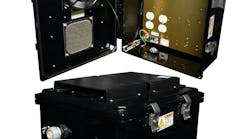By John McHale
TEMPE, Ariz. — Officials at the Motorola Computer Group (MCG) in Tempe, Ariz., recently announced the first transfer of their aging XR Systems Products to GD California (GDC) in Livermore, Calif.
GD California experts have been manufacturing several different obsolete Motorola circuit assemblies since 1995 to provide military and commercial customers with continued product service, maintenance, production, and support.
"Motorola Computer Group's core competency is the design, marketing, and sales of state-of -the-art, leading-edge technology," says Jerry Gipper, director of business development and planning at Motorola.
"GDC's core competency is the maintenance of products that manufacturers can no longer support. By building an alliance with GDC our core competency is leveraged, creating an advantage for us, GDC and our customers," Gipper says. Through the alliance "Motorola Computer Group can focus on new product development and sustaining engineering on the more popular and current technology products."
Motorola officials say the alliance will offer the best service to longtime customers. "Motorola is committed to developing new industry and leading edge products while still recognizing its responsibility to its current customer," says Mike Sulyma, systems product manager at GD California. "The alliance between MCG and GDC has successful since 1995, in the transfer and support of 50 different VME circuit card assemblies. And this will result in the addition of all levels system product support."
The alliance with GD California places Motorola in the best possible business position, Gipper explains. "We had a relationship with Micro Industries for some pre-VMEbus technologies, but when we started to transition some of our older VMEbus products we re-evaluated the potential solutions," he says. "GD California was chosen because of their merits and the fact that they were only focused on end of product life management. Micro Industries had started to move into new product design and were no longer a good match. They became a competitor to some of our products."
Some Motorola boards that recently transferred to GD California include the MVME320B, the MVSBV35, and related modules for the MVSB742. Gipper says Motorola, on average, keeps a product for 10 years before shipping it to GDC. Products transferred to GD California are spread evenly across all of the market segments that Motorola serves, not just the military, Gipper says.
"Customers that have long service life on their products benefit the most," he continues. "Many of our customers have products that are bought as expensive capital equipment and thus have very long service lives, in excess of 20 years in many cases. [For example] telecom switch products are deployed for 20-30 years by many [original equipment manufacturers] and industrial automation equipment can be used in factories for over 10-15 years. There are many examples of non-military customers having long product life cycles."
For more information on GD California contact Tobin Costen by phone at 925-456-9900, ext. 240, by e-mail at [email protected], or on the World Wide Web at http://www.gdca.com.


